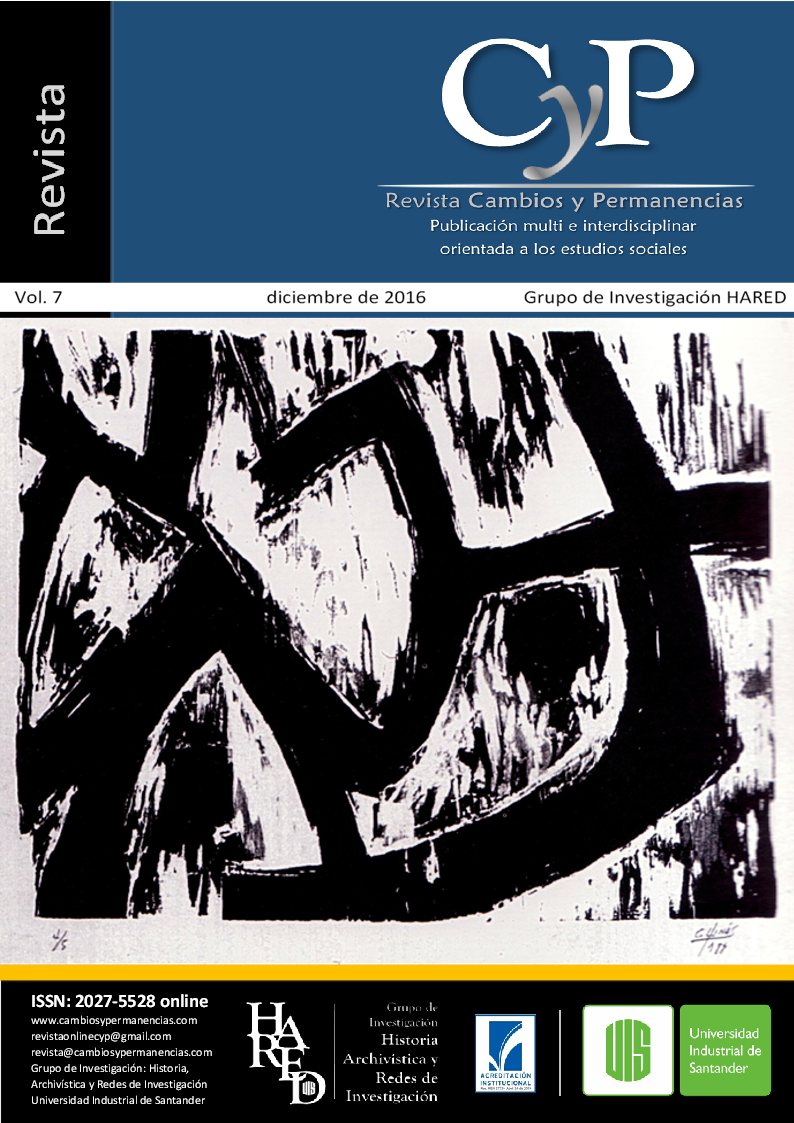DOSSIER PARA LA MEMORIA: EXCLUIDOS, COMUNIDADES Y POSCONFLICTO. SOBRE LA
Dynamics of victimization over indirect victims of the colombian armed conflicts Conceptual
Keywords
- Narrative,
- victimization,
- memory,
- symbolic reparation,
- human rights
How to Cite
García Rodríguez, R., Ramírez Salazar, M. A., & Ruiz Roldan, C. A. (2016). Dynamics of victimization over indirect victims of the colombian armed conflicts Conceptual. Cambios Y Permanencias, (7), 740–756. Retrieved from https://revistas.uis.edu.co/index.php/revistacyp/article/view/7071
Abstract
This investigation project is looking to find an answer to the following question; what are the dynamics of victimization over indirect victims of the Colombian armed conflict? In order to reach this, it was made an interdisciplinary search about the concept of indirect victim. Then, some interviews were done of the indirect victims, -which were obtained from an archive named Oral Archive of the Victim’s Memory (AMOVI) from the Industrial University of Santander (UIS) - and these were analyzed. The result is the manifestation of a set of special facts of indirect victims, that show the particularity of this population which leads to a different deal and way to repair them.
Downloads
Download data is not yet available.
References
Barlett, F.C. (1932). Recordar. Estudio de psicología experimental y social, Madrid, Alianza, 1995.
Bédarida, F. (1993). La mémorie contre l’historie. Espirit, 193 (7), 5-13.
Congreso de la República de Colombia. (2011). Ley 1448 de 2011 "Ley de Víctimas y Restitución de Tierras". Bogotá, Colombia: República de Colombia.
Duarte, R. (2012). Análisis Crítico del Acto Victimizador. Ponencia escrita en el marco del XII Congreso Internacional de Humanidades: “Ética desde las víctimas en contextos de violencia”, organizado por la Universidad Santo Tomás, Bucaramanga, Colombia.
Dudai, R. (2011). Closing the gap: symbolic reparations and armed groups. International Review Of The Red Cross, 93 (883), 783-808.
Fiscalía General de la Nación de Colombia (2005). Ley 975 de 2005.
Garzón, A. (1993). Marcos sociales de la memoria. Un enfoque ecológico. Psicothema, 5 (suplemento), 103-122.
González, R. (2010). La violencia en Colombia. Una mirada particular para su comprensión de cómo percibimos la violencia social a gran escala y hacemos invisible la violencia no mediática. Investigación & Desarrollo, Revista Latinoamericana de Ciencias Sociales y Desarrollo Humano, 18. Recuperado de: http://rcientificas.uninorte.edu.co/index.php/investigacion/article/viewArticle/1201/4599
International Center for Transitional Justice (2009). Providing meaningful reparations to victims. ICTJ Briefing.
Neisser, U. (1982). Memory observed. Remembering in natural contexts. San Francisco: W.H. Freeman.
Olick, J K. y Robbins, J. (1998). Social memory studies: from “collective memory” to the historical sociology of mnemonic practices. Annual Rev of Sociol. 24, 105–140.
Peña, C. (2013). El costo de las reparaciones, ¿Quién está pagando la justicia transicional? Revista de Derecho Público, 31.
Schöpflin, G. (2000). Nations, identity, power. New York: University Press.
Torres, H (2014). El terrorismo de Estado como delito de lesa humanidad. Diálogos de Saberes, (41), 119-137.
Wiesel, E. (1989). El olvido. Barcelona: Edhasa.
Winter, J. (2006) 'Notes on the memory boom: war, remembrance, and the uses of the past. En D. Bell. (Eds). Memory, trauma and world politics: reflections on the relationship between past and present (pp. 54–74). Palgrave Macmillan: Basingstoke.
Bédarida, F. (1993). La mémorie contre l’historie. Espirit, 193 (7), 5-13.
Congreso de la República de Colombia. (2011). Ley 1448 de 2011 "Ley de Víctimas y Restitución de Tierras". Bogotá, Colombia: República de Colombia.
Duarte, R. (2012). Análisis Crítico del Acto Victimizador. Ponencia escrita en el marco del XII Congreso Internacional de Humanidades: “Ética desde las víctimas en contextos de violencia”, organizado por la Universidad Santo Tomás, Bucaramanga, Colombia.
Dudai, R. (2011). Closing the gap: symbolic reparations and armed groups. International Review Of The Red Cross, 93 (883), 783-808.
Fiscalía General de la Nación de Colombia (2005). Ley 975 de 2005.
Garzón, A. (1993). Marcos sociales de la memoria. Un enfoque ecológico. Psicothema, 5 (suplemento), 103-122.
González, R. (2010). La violencia en Colombia. Una mirada particular para su comprensión de cómo percibimos la violencia social a gran escala y hacemos invisible la violencia no mediática. Investigación & Desarrollo, Revista Latinoamericana de Ciencias Sociales y Desarrollo Humano, 18. Recuperado de: http://rcientificas.uninorte.edu.co/index.php/investigacion/article/viewArticle/1201/4599
International Center for Transitional Justice (2009). Providing meaningful reparations to victims. ICTJ Briefing.
Neisser, U. (1982). Memory observed. Remembering in natural contexts. San Francisco: W.H. Freeman.
Olick, J K. y Robbins, J. (1998). Social memory studies: from “collective memory” to the historical sociology of mnemonic practices. Annual Rev of Sociol. 24, 105–140.
Peña, C. (2013). El costo de las reparaciones, ¿Quién está pagando la justicia transicional? Revista de Derecho Público, 31.
Schöpflin, G. (2000). Nations, identity, power. New York: University Press.
Torres, H (2014). El terrorismo de Estado como delito de lesa humanidad. Diálogos de Saberes, (41), 119-137.
Wiesel, E. (1989). El olvido. Barcelona: Edhasa.
Winter, J. (2006) 'Notes on the memory boom: war, remembrance, and the uses of the past. En D. Bell. (Eds). Memory, trauma and world politics: reflections on the relationship between past and present (pp. 54–74). Palgrave Macmillan: Basingstoke.

